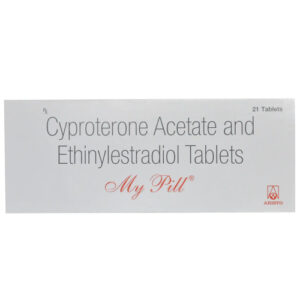ETHINYL ESTRADIOL + CYPROTERONE ACETATE ETHINYLOESTRADIOL
Ethinyl Estradiol: Ethinyl Estradiol is a synthetic form of the hormone estrogen. It belongs to a class of medications called oral contraceptives, commonly known as birth control pills. It is predominantly used to prevent pregnancy by inhibiting ovulation, thickening cervical mucus to block sperm from reaching the egg, and altering the uterine lining to make implantation of a fertilized egg less likely.
The exact mechanism of action of Ethinyl Estradiol involves its ability to suppress the release of gonadotropins (luteinizing hormone and follicle-stimulating hormone) from the pituitary gland. This prevents follicular development, which in turn prevents ovulation. It also alters the cervical mucus, making it less hospitable to sperm, and alters the endometrium, making it less likely for a fertilized egg to implant.
The standard dose of Ethinyl Estradiol is 30 to 35 mcg per tablet, though dosages may vary depending on the specific formulation. It is typically taken orally once daily for 21 days, followed by a 7-day break (or a 7-day course of placebo tablets) before starting a new pack. It is important to follow the instructions provided by the healthcare professional or the manufacturer.
As with any medication, Ethinyl Estradiol may cause side effects. Common side effects include nausea, breast tenderness, headache, mood changes, weight gain, and irregular menstrual bleeding or spotting. These side effects are usually mild and temporary, but if they become severe or persistent, it is advisable to consult a healthcare professional.
There are certain risks associated with the use of Ethinyl Estradiol. It may increase the risk of blood clots, especially in women who smoke or have other risk factors such as obesity, high blood pressure, or a history of blood clots. Other potential risks include an increased risk of cardiovascular events, liver problems, and an increased risk of certain types of cancer. It is crucial to discuss individual risks and benefits with a healthcare professional before starting Ethinyl Estradiol.
Cyproterone Acetate Ethinyloestradiol: Cyproterone Acetate Ethinyloestradiol, also known as cyproterone acetate/ethinyl estradiol or co-cyprindiol, is a combination medication used primarily for the treatment of acne and hirsutism (excessive hair growth) in women. It is also used as a form of hormonal contraception, but its primary indication is for managing symptoms related to androgen excess.
The drug works through two main mechanisms of action. First, cyproterone acetate acts as an anti-androgen by blocking the androgen receptors in the body, reducing the effects of testosterone and other androgens. Second, ethinyl estradiol is a synthetic form of estrogen, which helps suppress and control the excess production of androgens.
The usual recommended dose of cyproterone acetate/ethinyl estradiol for acne and hirsutism is one tablet daily, taken for 21 days of a menstrual cycle, followed by a 7-day tablet-free period. For contraception purposes, the same dosage is recommended, with the avoidance of the tablet-free period. It’s important to follow the instructions provided by your healthcare provider or listed on the medication label.
Like any medication, cyproterone acetate/ethinyl estradiol may cause side effects. Common side effects may include nausea, vomiting, breast tenderness, changes in menstrual bleeding pattern, and headaches. Less common but potentially serious side effects include blood clots, liver problems, and mood changes. It should not be used in women with a history of blood clots, certain types of cancer, or liver disease.
It is essential to discuss any existing medical conditions, medications, or allergies with your healthcare provider before starting cyproterone acetate/ethinyl estradiol. They can evaluate the appropriateness of this medication for your specific situation and provide guidance on its usage and any potential risks.

